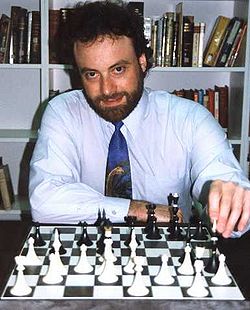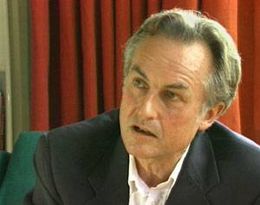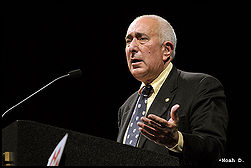Richard Dawkins and agnosticism
Atheism, as defined by the Stanford Encyclopedia of Philosophy, the Routledge Encyclopedia of Philosophy, and other philosophy reference works, is the denial of the existence of God.[1][2][3] In recent times, however, atheists have attempted to dilute the definition of atheism (see: Attempts to dilute the definition of atheism).
Many atheists like to make a distinction between strong atheism and weak atheism. They define strong atheism as believing God does not exist, while weak atheism as neither believing nor disbelieving. However, this usage is incorrect, and has been invented by atheists to boost their numbers. If you believe God does not exist, you are an atheist. If you neither believe nor disbelieve, you aren't an atheist, you are some kind of agnostic.
Contents
Ben Stein Interview with the evolutionist Richard Dawkins
In the film Expelled: No Intelligence Allowed, a documentary concerning suppression of the intelligent design movement, Ben Stein interviewed Richard Dawkins and Dawkins revealed himself to be an agnostic/weak atheist.[4] In addition, Ben Stein demonstrated the folly of evolutionism in his interview with Richard Dawkins (A clip of the interview has been uploaded to YouTube ). Moreover, in terms of the theism vs. atheism issue, Dawkins has shown himself to be rather ignorant in matters of theology and philosophy. For example, atheist philosopher Dr. Michael Ruse declared concerning Dawkins' book The God Delusion: "The God Delusion makes me embarrassed to be an atheist."[5]
The Discovery Institute provides an transcript of part of the interview along with some commentary:
| “ | BEN STEIN: "What do you think is the possibility that Intelligent Design might turn out to be the answer to some issues in genetics or in evolution?"
DAWKINS: "Well, it could come about in the following way. It could be that at some earlier time, somewhere in the universe, a civilization evolved, probably by some kind of Darwinian means, probably to a very high level of technology, and designed a form of life that they seeded onto perhaps this planet. Now, um, now that is a possibility, and an intriguing possibility. And I suppose it's possible that you might find evidence for that if you look at the details of biochemistry, molecular biology, you might find a signature of some sort of designer."
Years ago, everybody knew that the earth was flat. Everybody knew that the sun revolved around the earth. Today, everybody knows that life on earth is either the result of random evolution or the work of a supernatural God. Or is it? In "Message from the Designers", Rael presents us with a third option: that all life on earth was created by advanced scientists from another world. Richard Dawkins and Rael; "clear thinking" kindred spirits! [6] |
” |
A Christian apologetics website provides some additional commentary on the Ben Stein/Richard Dawkins interview which focuses on Dawkins response to Ben Stein's questions about the likelihood of the existence of God:
| “ | In this interview there is the following exchange between Ben Stein and Richard Dawkins. Mr. Stein prefaces the exchange with this comment: “Professor Dawkins seemed so convinced that God doesn’t exist that I wondered if he would be willing to put a number on it.” Here is Professor Dawkins response, “Well, it’s hard to put a figure on it, but I’d put it at something like ninety-nine percent against or something like that.” Mr. Stein responded with this question. “Well, how do you know it’s ninety-nine percent (“I don’t,” Dr. Dawkins interjects.) and not, say, ninety-seven percent?” Dr. Dawkins continues, “You asked me to put a figure on it and I’m not comfortable putting a figure on it. I think it’s… I just think it’s very unlikely.” “But you couldn’t put a number on it?,” Mr. Stein clarifies. “No, of course not,” said Dr. Dawkins. “So it could be forty-nine percent?,” Mr. Stein asks. Dr. Dawkins replies, “Well, it would be… I mean I think it’s… it’s… it’s unlikely, but… but… I… and it’s quite far from fifty percent.” (He's very difficult to quote.) “How do you know?,” Mr. Stein asks. “I don’t know, I mean, I put an argument in the book,” Dr. Dawkins responds.[7] | ” |
Stein expressed surprise in the narration that Richard Dawkins "believe[d] in intelligent design."[8]
Instead of attempting to defend abiogenesis, Dawkins actually suggested directed panspermia—the very thing that Francis Crick once suggested to explain life's beginnings.
Richard Dawkins and deism

(photo by Shane Pope, Title: Richard Dawkins, obtained from Flickr, see license agreement)
In 2008, the reporter Melanie Phillips wrote in the American Spectator:
| “ | On Tuesday evening I attended the debate between Richard Dawkins and John Lennox at Oxford’s Natural History Museum. This was the second public encounter between the two men, but it turned out to be very different from the first. Lennox is the Oxford mathematics professor whose book, God’s Undertaker: Has Science Buried God? is to my mind an excoriating demolition of Dawkins’s overreach from biology into religion as expressed in his book The God Delusion -- all the more devastating because Lennox attacks him on the basis of science itself. In the first debate, which can be seen on video on this website, Dawkins was badly caught off-balance by Lennox’s argument precisely because, possibly for the first time, he was being challenged on his own chosen scientific ground.
This week’s debate, however, was different because from the off Dawkins moved it onto safer territory– and at the very beginning made a most startling admission. He said: A serious case could be made for a deistic God. This was surely remarkable. Here was the arch-apostle of atheism, whose whole case is based on the assertion that believing in a creator of the universe is no different from believing in fairies at the bottom of the garden, saying that a serious case can be made for the idea that the universe was brought into being by some kind of purposeful force. A creator. True, he was not saying he was now a deist; on the contrary, he still didn't believe in such a purposeful founding intelligence, and he was certainly still saying that belief in the personal God of the Bible was just like believing in fairies. Nevertheless, to acknowledge that ‘a serious case could be made for a deistic god’ is to undermine his previous categorical assertion that ...all life, all intelligence, all creativity and all ‘design’ anywhere in the universe is the direct or indirect product of Darwinian natural selection...Design cannot precede evolution and therefore cannot underlie the universe.[9] |
” |
Richard Dawkins 2006 interview with Alister McGrath

Creation Ministries International reported:
| “ | A correspondent kindly let us know of a BBC television interview with Richard Dawkins which was first broadcast in Britain in September 2006, shortly after he’d published his latest book The God Delusion. During that interview, Dawkins let slip a comment which, on the face of it, seems to be an amazing softening in his (formerly?) scoffing disdain for the idea that a ‘Supremely Intelligent Being’ is behind the laws of the universe.
He made the comment while being interviewed with Alister McGrath on the BBC Heaven and Earth television program, hosted by Gloria Hunniford.1 The interview opened with both men recounting how they’d arrived at their present views—McGrath from atheism to belief in a Creator, specifically the God of the Bible; Dawkins from ‘a Christian upbringing’ to atheism. Note the two ‘events’ that Dawkins cited as being pivotal in his slide into atheism: He remembers thinking, ‘Since there are so many different religions, they can’t all be right’, so he says he became an agnostic. [Indeed, they can’t all be right, but it is logically fallacious to argue from this to ‘they must all be wrong.’ For a counter to this, see: ‘Holy Books?’] Dawkins says the key atheism-inducing event was ‘really when I discovered Darwinism’. [And he’s not the only one to have unfortunately (and erroneously) been so influenced — see ‘Playwright just plain wrong’.] Sitting next to the eloquently-spoken McGrath, and under some pressure from interviewer Ms Hunniford’s challenge that Dawkins had ‘no proof’ to justify his ‘there is no God’ stance, in his following comments Dawkins—though still clinging to his belief in a self-creating universe—appears to forget his past outspoken disdain for the concept of an Intelligent Designer: ‘You can’t prove the non-existence of anything, so it’s impossible to prove that God doesn’t exist. … None of us believes in Thor and his hammer, none of us believes in the Flying Spaghetti Monster. … The best explanation I could just about imagine somebody saying [would be] some sort of immense cosmic intelligence—that I could …—I mean, I don’t believe that but I could just about respect that.’ On the face of it, that’s quite a concession, compared to Dawkins’ previous rants and disparaging railings against any such suggestion of an ‘immense cosmic intelligence’ being behind the laws of the universe.[10] |
” |
Richard Dawkins and misotheism

In 2008, Dr. Don Batten of Creation Ministries International wrote:
| “ | Dawkins’ proselytizing ways remind me of my pimply youthful days at boarding school where those into smoking cigarettes and boozing (worse was yet to come) seemed to be really keen to get others to follow their destructive and illicit behaviour. Why did they try to coerce their fellow students into doing such things? Was it ‘safety in numbers’, that they felt a little guilty for their behaviour and would feel more secure if they could get more to join in their little rebellion?
Professor Dawkins’ obsessive campaign to try to convince others to be atheists reminds me of those days. Perhaps it is not that Dawkins really believes that there is no Creator-God, but that he wishes there were not and if he could just convince enough others to agree with him, then he will feel more secure. Has he confused his wishful thinking for reality? Perhaps ironically, the Humanist Manfesto III says, ‘We accept our life as all and enough, distinguishing things as they are from things as we might wish or imagine them to be.’ Dawkins’ wishful thinking comes out in his definition of biology, where he wishes away the evidence for design (a Creator): ‘Biology is the study of complicated things that give the appearance of having been designed for a purpose.’ Another self-professed atheist, Thomas Nagel, Professor of Philosophy at New York University, put it rather candidly:  Recently, a Christian apologist called Richard Dawkins a "cowardly clown" for refusing to debate apt debate challengers such as the creation scientists at Creation Ministries International.[12] Dr. Jonathan Sarfati recently published the book The Greatest Hoax on Earth which rebuts Richard Dawkins' recent book The Greatest Show on Earth.[13] ‘I want atheism to be true and am made uneasy by the fact that some of the most intelligent and well informed people I know are religious believers. It isn’t just that I don’t believe in God and naturally, hope there is no God! I don’t want there to be a God; I don't want the universe to be like that.’... So, is Richard Dawkins an atheist? He seems more like a God-hater than a genuine atheist. That’s why my colleague, Jonathan Sarfati, invented the word ‘misotheist’ (hater of God), which he has applied to Professor Dawkins and other fanatical opponents of the God of the Bible. George Orwell identified this sort of ‘atheist’ in the character of Bozo, in Down and Out in Paris and London: ‘He was an embittered atheist (the sort of atheist who does not so much disbelieve in God as personally dislike Him)’. Interestingly, in The God Delusion, Dawkins carries on about what he doesn’t like about the God he doesn’t believe in.[14] |
” |
References
- ↑ Stanford Encyclopedia of Philisophy - Atheism and Agnosticism
- ↑ Is Atheism More Rational? by Creation Ministries International
- ↑ Atheism - Etymology
- ↑ http://www.discovery.org/a/4589
- ↑ http://www.alternet.org/media/47052?page=entire
- ↑ http://www.discovery.org/a/4589
- ↑ http://www.readyalways.org/Home/does-god-exist
- ↑ D'Souza, Dinesh. "Ben Stein Exposes Richard Dawkins." <Townhall.com>, April 21, 2008. Accessed April 21, 2008.
- ↑ http://www.spectator.co.uk/melaniephillips/2543431/is-richard-dawkins-still-evolving.thtml
- ↑ http://creation.com/is-richard-dawkins-weakening
- ↑ Question evolution! campaign by Creation Ministries International
- ↑ http://www.truefreethinker.com/articles/richard-dawkins-cowardly-clown
- ↑ http://www.truefreethinker.com/articles/richard-dawkins-cowardly-clown
- ↑ Is Richard Dawkins an atheist?

